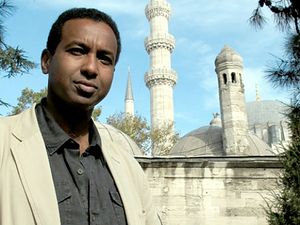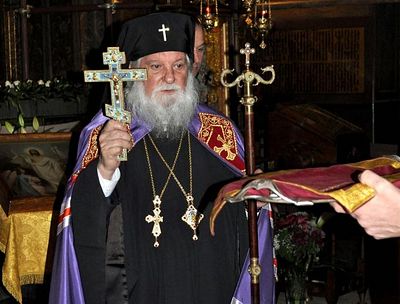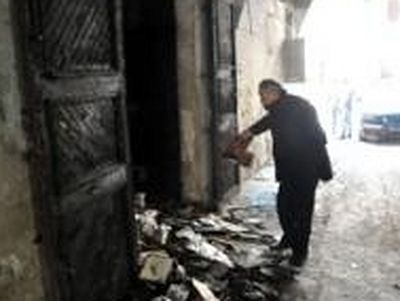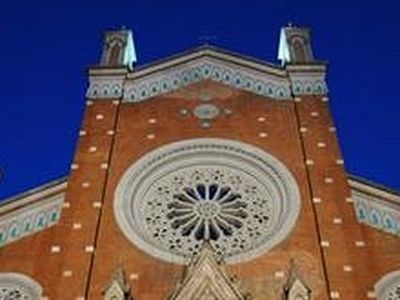Source: Breitbart

(If you don't have BBC World News on your cable system, the series is available on iTunes and on DVD.)
While it's not exactly a whitewash of the invasion into Europe of Muslims from Turkey, and the subsequent centuries-long occupation, it's not a condemnation either.
As the U.K. Catholic Herald wondered at the time of the show's premiere:
The title of the series tries to sneak in a rather contentious point as a given--'Europe's Muslim Emperors.' Some mistake, surely? While large swathes of Europe did fall under Ottoman rule, for centuries this rule was deeply resented, and the powers of Europe, or at least most of them, did their best to expel the invader.
Even if the Ottoman Turks may have ruled parts of Europe, their civilisation was not European, but Asiatic. As someone once said, 'Turkey has always represented a different continent, in permanent contrast to Europe.' It would make sense to describe the Turkish Sultans not as European, but anti-European.
And while the series has three hours to tell its story, it wastes an inordinate amount of time with static shots of host Rageh Omaar--a British Sunni Muslim of Somali heritage--walking hither and thither, staring moodily across landscapes or squinting at interviewees.
Many of these sequences are repeated episode to episode, along with verbatim sections of certain interviews, leaving one to wonder if the budget just didn't allow for enough material to fill three full hours, because the whole thing, while sumptuously filmed, feels thin in places in terms of history and information. Or perhaps, Omaar used his own face or beautiful images to fill in gaps where there were parts of the story he wanted to soften or minimize.
And sometimes, the images don't live up to the words.
Omaar, the International Affairs Editor for ITV News in the U.K. (and late of Al Jazeera English and the BBC) shows us pictures of what he says are spectacular Ottoman buildings, but the most impressive is Hagia Sophia in Istanbul, which no doubt was even more magnificent when it was a Christian church in the former Constantinople, before Ottoman conquerors stripped it of much of its art and religious symbols.
Otherwise, Omaar does show us the lovely 16th Century Suleymaniye Mosque in Edirne, Turkey, which is the work of Sultan Suleiman the Magnificent's gifted architect, Mimar Sinan.
But as it turns out, Sinan was born a Bosnian Christian, taken from his family as a little boy as part of a system of child enslavement called devshirme, forcibly converted to Islam and raised a Muslim. This was a common practice of the Ottomans, who used these kidnapped lads to help build their armies. But Omaar and his experts point out that some went on to have glittering careers, so that's, one supposes, all right then.
Christian girls were also taken and forced into harems, where, as it's pointed out, they had the chance to become the mothers of sultans, so, again, what's your problem? (Apparently abducted concubines, lacking any protection or social status, were easier to deal with than women with troublesome relations who might want things.)
Other than the Suleymaniye Mosque, the buildings Omaar tours are not particularly magnificent, nor do they look particularly well-kept.
At more than one point, he gazes out at the Bosphorus Straits, a view he says "takes your breath away," where Ottoman emperors could view the two continents they ruled.
True, but the same could have been said of rulers of the earlier Byzantine Empire, which under Justinian in the 6th Century, extended into North Africa and Italy.
At one point, a British historian states that Europe is "richer for" the Ottoman Empire, but the documentary never really explains how, except to say there was a lot of "multiculturalism" and trade (which one supposes would have gone on anyway). It does go to great pains to talk about how "tolerant" the Ottomans were of Christians and Jews, so long as they peacefully accepted their Muslim overlords, their second-class dhimmi status, and dutifully paid their extra taxes (oh, and if they were Christians, tithed their sons and daughters).
To Omaar's credit, while it's evident that he's trying to put the best face on the situation, he does include many dissenting voices, including Eastern Christians, Greeks, and other descendants of people subjugated by the Ottomans. And while some of the historians practically glow in their admiration of the Ottomans--including some Brits--others are more skeptical.
Interestingly, the greatest threat to the Ottoman Empire's Muslim hegemony was, as Omaar repeatedly states, "nationalism," or, as Americans like to call it, self-rule, self-determination, and basic human freedom.
Things get stickiest at the end of the Empire around World War I, when the Ottomans were called the "sick man of Europe." The Empire sided with the Germans, as the Turks went on to do also in World War II, but Omaar's story ends before that (as did the Ottoman Empire) and leapfrogs into the present day.
There is an examination of the ejection of Greek Orthodox Christians from Turkey in 1923, exemplified by the occupation by Muslim newcomers of an entire Greek town (now abandoned because the new residents couldn't make a go of it), balanced by the woes of one Muslim family who had to leave Greece (but look to be doing pretty well in modern times).
Of course, then there's the question of the wholesale slaughter of Armenian Christians in Turkey, generally said to have begun in April 1915, which even the often left-leaningHistory Channel labels as the "Armenian Genocide." Omaar's interview leaves the exact labeling of the atrocity an open question.
In the last episode, Omaar examines the rise of leader Mustafa Kemal Ataturk and his spearheading of the transformation of the Ottoman theocracy into the modern secular (or at least it was, until recent elections) Republic of Turkey.
But Omaar laments the decline of Islam as a guiding force under Ataturk and seems pleased to see it return, with Turkey presenting an opportunity to see if Islam and democracy can co-exist (an experiment that is far from over). He also seems to approve of a lavish Turkish TV-series--titled, in English, "Magnificent Century"-- which adds a dose of glamour to a depiction of Suleiman's court.
But one merit in watching Ottomans is that it reinforces the ongoing role of Russia in all these affairs, and how often it positioned itself as the defender of Eastern Christianity. Current Russian President Vladimir Putin, in partnership with Patriarch Kirill of the Russian Orthodox Church, has made moves in Syria and most recently in Iraq that are reviving the historic notion of Russia as the last bastion against Christian genocide.
The series also digs into inter-Muslim disputes, between Sunni and Shia, between Turks and Arabs, that can shed some light on the endless Muslim-on-Muslim violence that plagues the Middle East to this day. And it clearly shows that persecution of Christians, genocide of Christians, abuse of Christian children and women, and so on, is nothing new.
Reaction in the U.K. to the series has been mixed, with some Muslim commentatorswondering if not enough credit was given to Islam itself, and the U.K.'s Catholic Herald calling it "balanced" but wondering why Omaar didn't go further in explaining why the Turks failed to move into the modern era, and why the notion of a "Caliphate" is still so enticing to them.
American viewers can find something of value in Ottomans, even if it's only a sketch of an issue and era not often discussed, but which does bear on current events, provided they remember throughout that Omaar, while making efforts to appear balanced, has a definite pro-Ottoman and pro-Islam slant. This isn't surprising--or unusual, as many documentary series that also function as a personal journey of the host have a distinct point of view--but bear it in mind.
As an aside, here's one of Omaar's recent tweets about the current conflict in Israel, which may give you some sense of his mindset (it's only one of many, many tweets on the situation, universally in support of the Palestinian side): "don't think egypt with will do much to pressure israel into concessions - both share aim of trying to undermine hamas as much as possible."
He's also devoted recent tweets to soccer news, but going back to July, has been silent himself on the persecution and murder of Christians in Iraq. He did, however, on Aug. 6 retweet this U.K. Telegraph story on Iraqi religious minorities stranded on a mountain top while fleeing Islamic State militant death threats and attacks.



